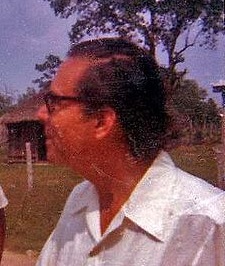
Politics of Belize takes place in a framework of a parliamentary representative democratic monarchy, whereby Queen Elizabeth II serves as head of state and the prime minister is the head of government, and of a multi-party system. Executive power is exercised by the government. Legislative power is vested in both the government and the Parliament of Belize.

British Honduras was a British Crown colony on the east coast of Central America, south of Mexico, from 1862 to 1964, then a self-governing colony, renamed Belize in June 1973, until September 1981, when it gained full independence as Belize. British Honduras was the last continental possession of the United Kingdom in the Americas.

Said Wilbert Musa is a Belizean lawyer and politician. He was the Prime Minister of Belize from 28 August 1998 to 8 February 2008.

George Cadle Price, PC, OCC, was a Belizean statesman who served twice as the head of government of Belize from 1961–1984 and 1989–1993. He served as First Minister and Premier under British rule until independence in 1981 and was the nation's first prime minister after independence that year. He is considered to have been one of the principal architects of Belizean independence. Today he is referred to by many as the "Father of the Nation". Price effectively dominated Belizean politics from the early 1960s until his 1996 retirement from party leadership, serving as the nation's head of government under various titles for most of that period.

A legislative election was held in Belize on 5 March 2003. Belizeans elected 29 members to the House of Representatives for a term of five years.

A legislative election was held in British Honduras on 20 March 1957.
United Black Association for Development (UBAD) was a cultural and political party established in Belize in February 1969 and based on traditional Black Power tenets.
The Democratic and Agricultural Labour Party (DALP), more commonly referred to as the Christian Democratic Party (CDP), was a short-lived political party in Belize. It promoted Christian Democratic ideals.

A legislative election was held in the nation of Belize on February 7, 2008. Beginning with this election, Belizeans elected 31 members to the House of Representatives of Belize instead of 29. In what was considered an upset, the opposition United Democratic Party (UDP) won the election with 25 out of 31 seats; the ruling People's United Party won six.

The Constitution of Belize is the supreme law of the nation of Belize. It was signed on September 1981 with effect from that date.
Philip Stanley Wilberforce Goldson was a Belizean newspaper editor, activist and politician. He served in the House of Representatives of Belize as member for the Albert constituency from 1965 to 1998 and twice as a minister. Goldson was a founding member of both of Belize's current major political parties, the People's United Party (PUP) in the 1950s and the United Democratic Party (UDP) in the 1970s. He was also the leading spokesman of the hardline anti-Guatemalan territorial claims National Alliance for Belizean Rights party in the 1990s.
The History of Belize dates back thousands of years. The Maya civilization spread into the area of Belize between 1500 BC to 1200 BC and flourished until about 1000 AD. Several Maya ruin sites, including Cahal Pech, Caracol, Lamanai, Lubaantun, Altun Ha, and Xunantunich reflect the advanced civilization and much denser population of that period. The first recorded European settlement was established by shipwrecked English seamen in 1638. Over the next 150 years, more English settlements were established. This period also was marked by piracy, indiscriminate logging, sporadic attacks by natives, and neighboring Spanish settlements.
Leigh Richardson was a Honduran-born Belizean politician. Richardson served as the leader of the People's United Party in the 1950s, and also as mayor of Belize City.

Her Majesty's Government of Belize, also referred to as the Belizean Government is the democratic administrative authority of Belize, a constitutional monarchy under a parliamentary democracy. It was formed in 1981 after gaining sovereignty from the United Kingdom. The constitution is the supreme law of Belize.

General elections were held in Belize on 4 November 2015 to elect members of the House of Representatives. On 28 September 2015 Prime Minister Dean Barrow announced that he had advised the Governor-General to dissolve the National Assembly and to fix Wednesday 4 November 2015 as the date for the next general elections.
Carl Lindbergh Bernard Rogers, commonly known as C. L. B. Rogers, was a Hounduran-born Belizean politician.

The Nationalist Movement seeking independence for Belize first arose in the 1930s and 1940s. Three groups played important roles in developing the movement. One group consisted of working-class individuals and emphasised labour issues. This group originated with Antonio Soberanis Gómez and the Labourers and Unemployed Association (LUA) between 1934 and 1937 and continued through the General Workers Union (GWU). The second group, a radical black nationalist movement, emerged during World War II. Its leaders came from the LUA and the local branch of Marcus Garvey's Universal Negro Improvement Association (UNIA). This group called itself variously the British Honduras Independent Labour Party, the People's Republican Party, and the People's National Committee. The third group consisted of people such as the Christian Social Action Group (CSAG) who engaged in electoral politics within the narrow limits defined by the constitution. From the 1950s onwards the nationalist movement came to be dominated by the People's United Party which led the country to independence in 1981.
All references are taken from Lawrence Vernon, "A History of Political Parties in Belize", in the third edition of Readings in Belizean History edited by Lita Hunter Krohn and Froyla Salam.








